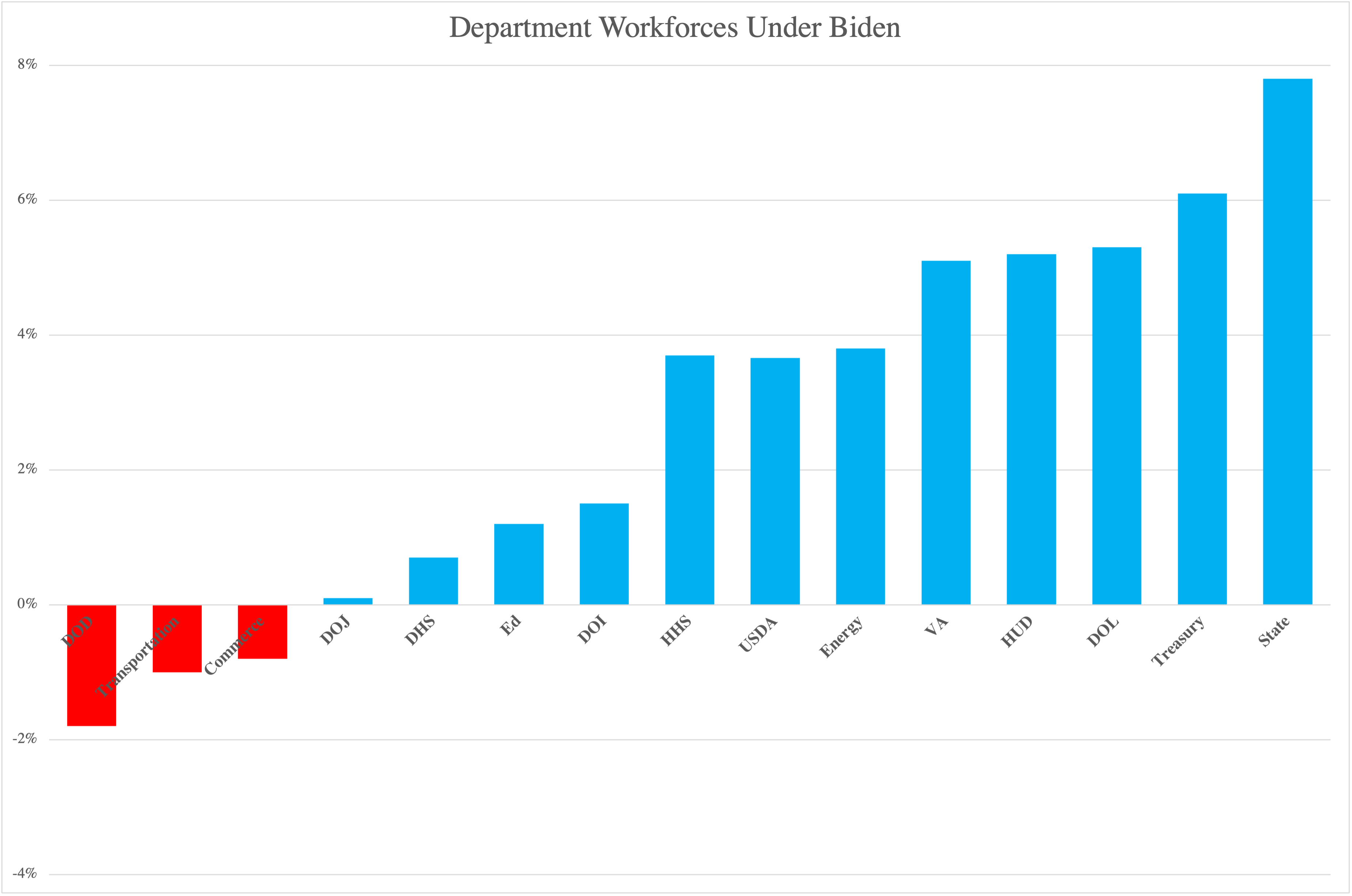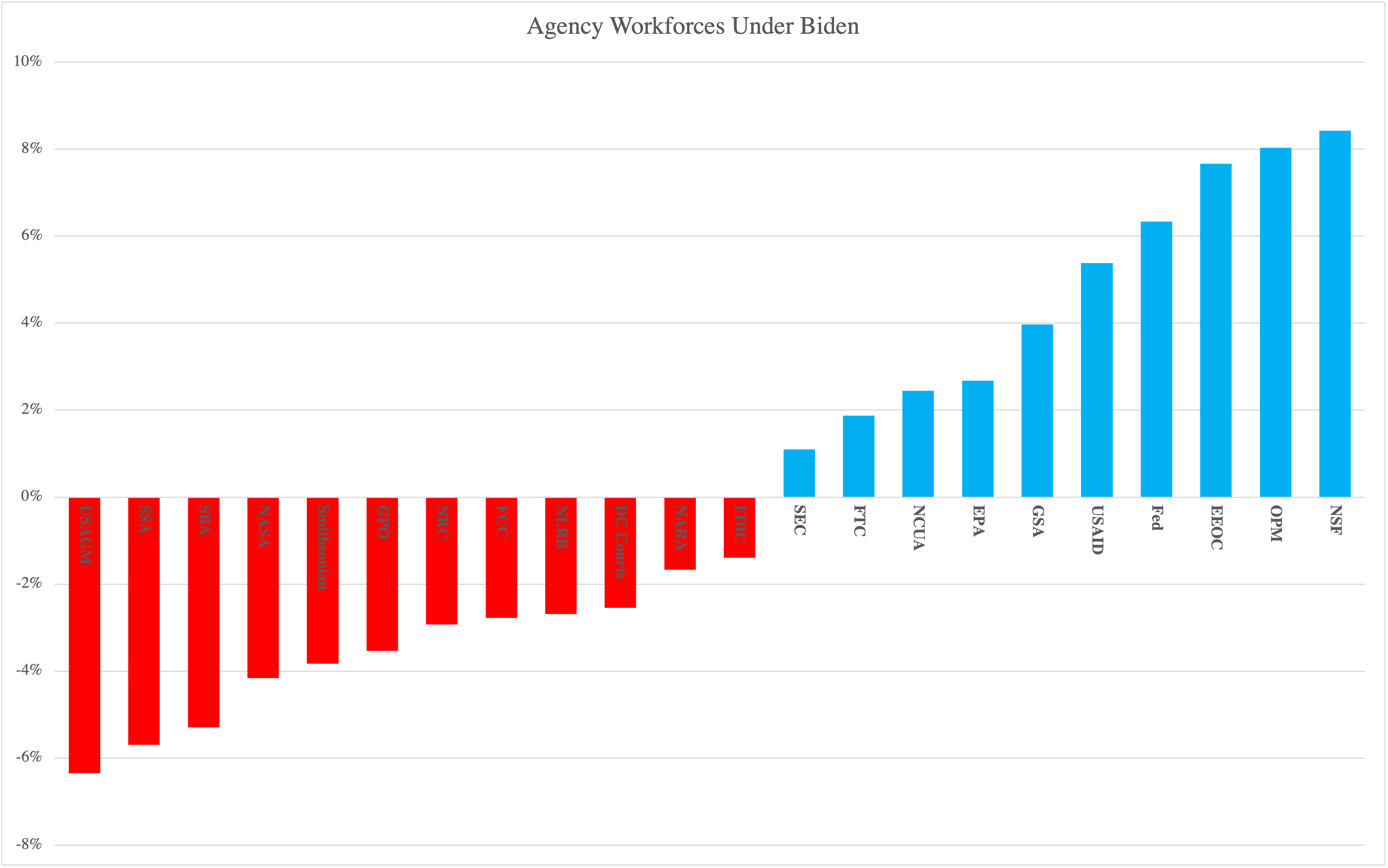
During his campaign, Joe Biden said a “strong, healthy” civil service would be “essential to the success” of his administration. Drew Angerer/Getty Images
Biden Promised to Revive a ‘Hollowed Out’ Federal Workforce. Has He Delivered?
A look at where the administration has overcome Trump-era downsizing, and how it hopes to drag lagging agencies into meeting its agenda.
This is the first part in a series. Click here for part two and here for part three on how individual agencies are adjusting to Biden’s workforce agenda.
As a presidential candidate, Joe Biden vowed to restore the federal workforce he said had been “hollowed out” by his predecessor. He called a “strong, healthy” civil service “essential to the success” of his administration.
More than halfway through his first term, however, President Biden has had muted success in realizing that promise. All told, the total permanent federal workforce has grown by just 0.9%, according to data maintained by the Office of Personnel Management. Individual agency reforms and targeted recruiting efforts, paired with some governmentwide changes, have allowed pockets of progress, including in some areas in which candidate Biden had promised to ensure growth.
Perhaps the lesson of the last six years is making fundamental changes to the size of the federal workforce—which has hovered right around 2 million for the last decade and a half—is exceedingly difficult. President Trump came into office promising to slash agency rolls: he immediately instituted a governmentwide hiring freeze and instructed every agency to develop plans to shrink their staffing levels. After four years, he saw the number of federal employees grow by 2%. That figure is a bit misleading, as gains at three departments—Homeland Security, Veterans Affairs and Defense—hid losses at every other department and virtually every major agency.
Some agencies that experienced the largest losses under Trump have struggled to regain their footing—even as non-defense agencies have virtually across-the-board enjoyed significant funding boosts—with staffing levels staying mostly flat. The departments of State, Treasury and Labor have made the largest increases. Only the departments of Defense, Transportation and Commerce have experienced a dip (even after accounting for only permanent, non-seasonal employees).

A Big Pivot
The White House named “strengthening the federal workforce” as a pillar of Biden’s management agenda in 2021 and subsequently identified priority goals of revamping the hiring process, attracting new federal workers in mission-critical jobs, promoting diversity and creating "more equitable" engagement.
“Over the last few years, many federal agencies have lost highly skilled workers in a variety of mission critical areas, which has made it more difficult for the federal government to accomplish its mission,” OPM said in a January update to its goal to “support critical and urgent recruitment and hiring.” It added that “significant work must be done across the federal government to put in place a workforce to meet the current moment.”
Veronica Hinton, OPM’s principal deputy associate director for Employee Services, told Government Executive in a recent interview that the Biden administration is focused on ensuring agencies “have the talent that they need in order to deliver” on key priorities, such as STEM and infrastructure. OPM—an agency the Trump administration designated for elimination altogether—has taken many steps to support those efforts, issuing guidance, launching governmentwide initiatives and working with individual agencies to support their specific needs.
“The biggest pivot from the previous administration is we're very proud of the work that we do here at OPM,” Hinton said, “and the work that we do in partnership with agencies to deliver for the American public and making sure that the American public and, particularly, those that want to serve have the opportunity to do so.”
OPM has launched efforts to recruit tech talent going through layoffs in the private sector, creating a hiring event in January with 50 federal, state and local agency participants and 1,800 potential applicant attendees. It has worked to better leverage the government's economies of scale, creating hiring pools for similar jobs that can be shared across agencies and requiring applicants to only go through one process to become eligible for many positions. It is also working frequently with agencies to follow through on a Trump administration priority to make qualification assessments of federal candidates more skills based, rather than emphasizing degrees. It has expanded remote work and is promoting it as a recruiting tool.
On a more micro basis, the Veterans Affairs Department received hiring and pay incentives from Congress as it attempts to keep pace with its growing patient load. The Internal Revenue Service has received expedited hiring authority to spend its unprecedented funding surge on thousands of new employees. The Labor Department is meeting Biden’s promise to increase its capacity to conduct investigations of potential workplace violations.

On a governmentwide level, OPM is also focusing on meeting agency needs to implement the Infrastructure Investment and Jobs Act. It aims to help impacted agencies fill 75% of the positions they will need to carry out the law by the end of September. As of the end of fiscal 2022, agencies have hired just more than half of the roles they previously identified. OPM has fulfilled 25 technical assistance requests from agencies looking for help in sorting through the complicated web of hiring authorities and the available flexibilities.
OPM Director Kiran Ahuja told Government Executive last year her agency is setting up "tiger teams" and taking an all-hands-on-deck approach to assisting agencies bring on more than 7,000 people to dole out the $1.2 trillion the law authorized.
“There’s a mix of what we can do collectively, there’s a bit around the planning piece of it, and I think more than anything that’s kind of inherent in this, since we’ve had such leadership attention on this effort [to implement the infrastructure law], I think everyone’s been involved,” she said. “Normally, when you think about hiring, it’s kind of in one segment of the agency, but if you want to be able to deliver on the things that are important to the American people that we’ve been asked to do, it really requires kind of a wholesale effort within an agency.”
OPM has so far authorized hiring flexibilities for the departments of Commerce, Interior and Agriculture, as well as the Environmental Protection Agency.

Kim Holden, a deputy director at OPM, said hiring and filling talent in government is a bipartisan issue.
“OPM has always looked for ways to make improvements in the hiring process and establish efficiencies for agencies and for applicants because we have a responsibility for both," Holden said. Efforts in the Biden administration, she added, represent "our way of thinking outside the box, and experimenting and piloting certain things."
Hinton highlighted the Biden administration is newly focused on establishing "agency talent teams" made up of experts in human resources, assessments and workplace behavior psychologists. OPM wants to ensure agencies are set up for short-term success in their immediate hiring needs, as well as long-term capability in identifying process and policy changes they will require.
Headwinds
Despite its efforts, the Biden administration is facing some significant headwinds. While improvements are underway, the federal hiring process is notoriously cumbersome—a problem exacerbated in a tight labor market. It is facing critical gaps in areas with immediate needs. Already, agency watchdogs are flagging potential capacity shortfalls as infrastructure bill implementation gets underway. Staffing needs related to implementation of the infrastructure projects “one of the most immediate challenges” GSA’s Public Building Service will face in doling out the $3.4 billion it received under the infrastructure bill, the agency’s inspector general said last year. PBS has seen nearly 13% of its project managers leave just since September 2021. The EPA IG highlighted staffing concerns as a key deficiency in the agency’s grants administration and oversight. Its grant workforce has seen “high turnover and heavy workload” and was “already overworked," it said.
Even as agencies receive new resources to build capacity, they often do not know their own needs.
“What we're seeing, and I think this is a struggle generally across agencies, is really taking time to do the needed strategic workforce planning to sit back and really say, ‘OK, what are my needs now and in the future?’”
The Biden administration over the last year has forced agencies to sit down and "do that homework and planning," Hinton said, with the hope that "really invest[ing] in their workforce planning" will pay dividends in the months and years ahead.







